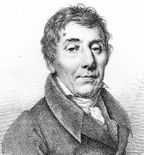Louis-Gabriel-Ambroise de Bonald
Louis-Gabriel-Ambroise de Bonald , Viscount de (born October 2, 1754 in the Château le Monna near Millau in the Aveyron department ; † November 23, 1840 ibid) was a French statesman and philosopher. In his state-theoretical works, Bonald represented a political and ecclesiastical conservatism and thus developed alongside Joseph de Maistre (1754-1821) to a pioneer of the ultra-royalists during the Restoration of the Bourbons (1814-1830).
Life
Origin and education
Louis-Gabriel-Ambroise de Bonald "came from a family of old French landed gentry in the southern province of Rouergue ". In 1769 he entered the college in Juilly , run by the Catholic Brotherhood of Oratorians , a boarding school east of Paris preferred by the French nobility in the 18th century . From 1774 until its dissolution at the end of 1776, he completed military training with the musketeers . He then married on February 22, 1778 Elisabeth-Marguerite Guibal de Combescure (born July 30, 1754 in Vigan), the daughter of the cavalry officer in the Régiment de la Reine Henri de Combescures and Marguerite Rolland († January 21, 1826 in the Château le Monna) . His son Louis-Jacques-Maurice de Bonald (1787-1870) became a cardinal.
Political career
On June 6, 1785 Bonald was elected mayor of his hometown Millau - despite his comparatively young age . In 1790, one year after the outbreak of the French Revolution , he became President of the Aveyron department as part of the administrative restructuring of France . As a result of the Constitution civile du clergé with the subsequent persecution of the priests who refused to take the state oath, he resigned on January 31, 1791 and a short time later went to Heidelberg with his two older brothers to join the counterrevolutionary emigre army of the Prince of Condé . In 1797 he returned to France, but refused any office in the Empire. In 1815 he became the emissary of the ultra-royalists. He represented a pronounced family and authority policy with the aim of reuniting church and state. With the Reformation , turmoil and individualism came into the world, modernity was decline. In his article "Sur les Juifs" published in 1806 there are also various anti-Jewish allegations (alleged parasitism, state within the state, etc.). “The restoration marked the high point of his career: in 1816 the Viscount was admitted to the Académie française , and in 1823 he was appointed Pair de France. He is entrusted with the management of the censorship. But in 1830, with the July Revolution, it was all over. He refuses to take the oath of allegiance to the new order and loses his censor office and all pensions. The citizen king Louis Philippe is a contemptuous figure to him. The rest is withdrawal. "
Work and style
De Bonald published numerous books and essays on the state, law, society, religion, philosophy and literature. Your impetus is disappointment with the results of the French Revolution . But: "Whoever imagines a reactionary to be a person who foams at the present time, will be taught better here," writes Andreas Dorschel . “De Bonald is an extremely clear thinker . He does not allow space in his prose to be nebulous. "
Fonts
- Œuvres complètes , 15 vols. Paris 1817–1843, reprinted Genève 1982, ISBN 2-05-100379-3
- Théorie du pouvoir politique et réligieux dans la société civile (1796)
- Essai analytique sur les lois naturelles de l'ordre social (1800)
- You divorce considéré au XIXe siècle (1801)
- Legislation primitive (1802)
- Pensées sur divers subjects (1817)
- Recherches philosophiques sur les premiers objets des connaissances morales (1818)
- Reflections on l'intérêt general de l'Europe (1815)
- Observations sur un ouvrage de Madame de Staël (1818)
- Mélanges littéraires, politiques et philosophiques (1819)
- Démonstration philosophique du principe constitutif de la société (1820)
- Legislation primitive considérée par les lumières de la raison (1821)
- Opinion sur la loi relative à la censure des journaux (1821)
- De la chrétienté et du christianisme (1825)
- De la famille agricole et de la famille industrial (1826)
- Discours sur la vie de Jésus-Christ (1834)
literature
- Jacques Alibert: Les triangles d'or d'une société catholique. Louis de Bonald, théoricien de la Contre-Révolution . Téqui, Paris 2002, ISBN 2-7403-0925-2
- David Klinck: The French counterrevolutionary theorist, Louis de Bonald (1754-1840) . Lang, New York 1996, ISBN
- Gabriele Lorenz: De Bonald as a representative of counter-revolutionary theory formation. An investigation into the systematics and history of effects . Lang, Frankfurt / M. 1997, ISBN 3-631-30658-X
- Rainer-Michael Lüddecke: Literature as an expression of society. The literary theory of the Vicomte de Bonald . Lang, Frankfurt / M. 1995, ISBN 3-631-48315-5
- Paolo Pastori: Rivoluzione e potere in Louis de Bonald . Olschki, Florence 1990, ISBN 88-222-3699-8
- Robert Spaemann : The origin of sociology from the spirit of the restoration. Studies on LGA de Bonald . Klett-Cotta, Stuttgart 1998, ISBN 3-608-91921-X
- Michel Toda: Louis de Bonald. Théoricien de contre-revolution . Edition Clovis, Étampes 1997, ISBN 2-903122-88-1
Remarks
- ↑ Andreas Dorschel , 'Enlightened Counter-Enlightenment', in: Süddeutsche Zeitung No. 25 (January 30, 2008), p. 16
- ↑ Andreas Dorschel , 'Enlightened Counter-Enlightenment', in: Süddeutsche Zeitung No. 25 (January 30, 2008), p. 16
- ↑ Andreas Dorschel , 'Enlightened Counter-Enlightenment', in: Süddeutsche Zeitung No. 25 (January 30, 2008), p. 16
- ↑ Andreas Dorschel , 'Enlightened Counter-Enlightenment', in: Süddeutsche Zeitung No. 25 (January 30, 2008), p. 16
Web links
- Literature by and about Louis-Gabriel-Ambroise de Bonald in the catalog of the German National Library
- Short biography and list of works of the Académie française (French)
| personal data | |
|---|---|
| SURNAME | Bonald, Louis-Gabriel-Ambroise de |
| BRIEF DESCRIPTION | French statesman and philosopher |
| DATE OF BIRTH | October 2, 1754 |
| PLACE OF BIRTH | Château de Monna near Millau |
| DATE OF DEATH | November 23, 1840 |
| Place of death | Château de Monna near Millau |
